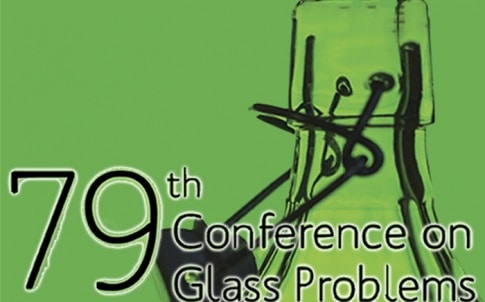
AMETEK Land announces that its Glass Sector Lead Mark Bennett and Consultant Neil Simpson of Simpson Combustion and Energy will speak at the 79th Conference on Glass Problems (GPC), November 5-8, 2018, in Columbus, Ohio, USA.
Mark Bennett and Neil Simpson will present “Industry 3.9 Thermal Imaging Using the Near Infrared Borescope (NIR-B) Glass” during a technical session on melting and combustion. Their presentation looks at the interpretation and management of the data captured from over 100,000 continuous temperature measurements using AMETEK Land’s NIR-B Glass infrared borescope. This data can be used as one of the steps toward achieving in the future full Industry 4.0 standards of quality, process control and autonomous operation.
Their presentation includes actual field data to demonstrate how glass producers have optimised their operations, and it shows how in practice, as in theory, that the batch really does want to go where it is colder. The speakers will discuss how a longitudinal thermal profile remains most critical in terms of pull, yield and energy, but also of importance is the transverse profile, which is critical in oxy-fuel furnace applications. With the benefit of real-time image interpretation and the integration into a control system of the NIR-B Glass it is now possible to create immediate deviation alarms with the potential to identify when a hot spot moves from the theoretical position to optimise product quality.
The speakers also will focus on how NIR-B Glass potentially offers glass producers a way to identify areas of high NOxproduction and provide a further level of operational improvement. That capability can be displayed visually using a special ‘NOx palette’ in the thermal imaging software, or it can be detected automatically and signalled to the control system. Mark and Neil will discuss how AMETEK Land technology enables a glass plant to maintain the production of high-quality glass, whilst optimising NOx emissions by controlling peak flame intensity, which benefits both the environment and operational efficiency.
The use of an NIR-B Glass borescope can be an essential part of maintaining high-quality glass production and a way to extend the campaign life of a furnace. Data from the NIR-B Glass can be used to improve response times, and then to identify and troubleshoot furnace operations to improve yield and to achieve higher pull and lower specific energy. For glass producers, these can result in increased asset life and improved furnace optimisation.
Mark Bennett, Glass Sector Lead at AMETEK Land comments, “We have made some major technological advances in the last 12 months. This means the delivery of excellent furnace optimisation and emissions reduction results for glass plant operators. I look forward to presenting these latest developments and to showing how our thermal imaging can now be used not only for monitoring purposes, but also to help optimise combustion efficiency and reduce emissions.”
AMETEK Land’s NIR-B Glass is a short wavelength, radiometric, infrared borescope imaging camera that is designed to produce high-definition (656 x 494 pixel) thermal images with over 324,000 accurate temperature measurement points in the field of view. The camera measures temperatures in the range of 1000° to 1800°C (1832° to 3272°F) and is suitable for float glass, container glass, borosilicate glass and fibre glass melt furnaces.
AMETEK Land will display the NIR-B Glass at its stand at Glass Problems 2018, alongside a range of other AMETEK Land temperature measurement instruments that are specifically designed for the glass industry.
About Glass Problems
The 79th Conference on Glass Problems is organised by the Glass Manufacturing Industry Council and Alfred University and endorsed by The American Ceramic Society. Glass Problems is among the industry’s leading international conferences and exhibitions and brings together industry leaders and suppliers, providing them with an opportunity to showcase latest products, technologies and innovations to the entire glass value-added chain. For more information, visit glassproblemsconference.org










Water Sector Talent Exodus Could Cripple The Sector
Maybe if things are essential for the running of a country and we want to pay a fair price we should be running these utilities on a not for profit...